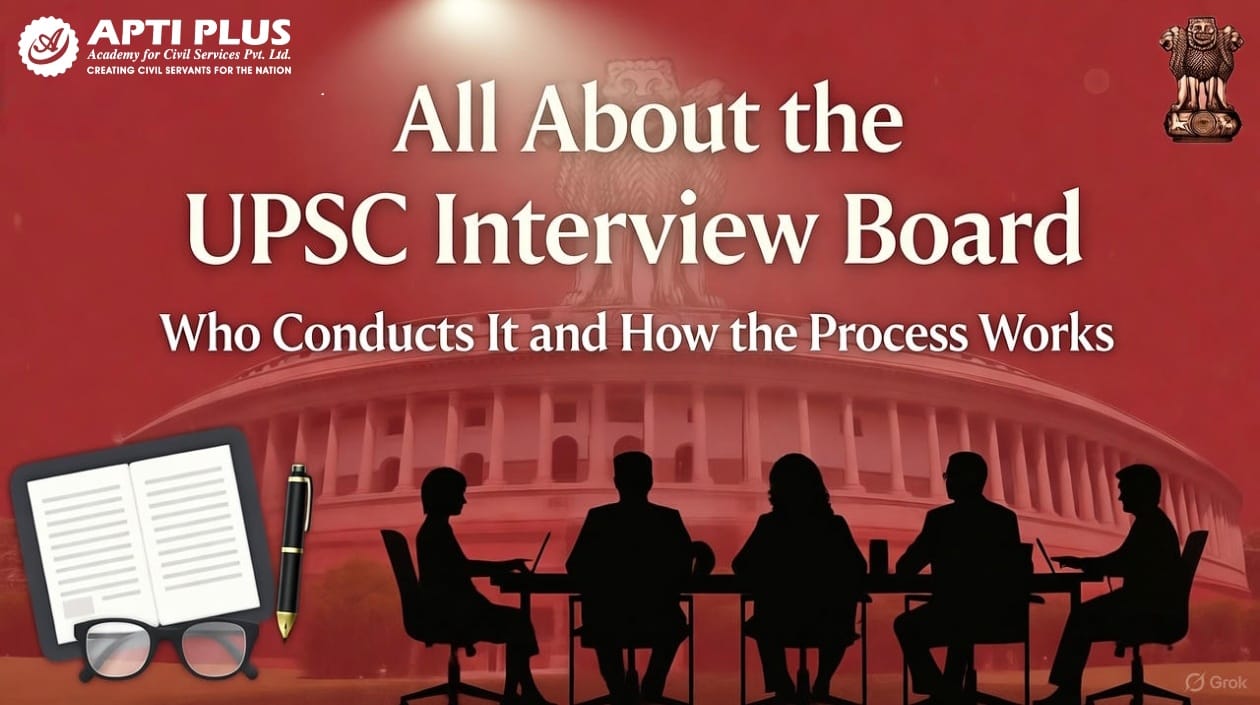




The UPSC Personality Test, popularly known as the UPSC Interview, is the final and most crucial stage of the Civil Services Examination (CSE) conducted by the Union Public Service Commission (UPSC). After clearing the Prelims and Mains, only a few thousand candidates reach this final phase -- where their personality, attitude and suitability for public service are assessed. The interview is not merely a test of knowledge but a test of character, clarity and confidence.
But who exactly takes the interview in UPSC? What is the composition of the interview board and how does the process unfold? Let’s break it down.
The interview is conducted by the Union Public Service Commission (UPSC) --a constitutional body established under Article 315 of the Indian Constitution. The Commission is headed by the Chairperson and comprises several Members, usually retired civil servants, academicians, or eminent professionals from diverse fields.
Each UPSC Interview Board (or Panel) is chaired by one of these Members. So, the interview is not taken by a single person but by a five-member panel, with the Chairperson of that particular board presiding over it.
Each interview board generally consists of:
Together, they form a diverse and balanced panel to evaluate a candidate from multiple perspectives.
There are generally 8–10 different interview boards operating simultaneously during the Personality Test phase, which usually spans over 1–2 months. Each board is headed by a Member of the UPSC and the panel members may vary each year.
The allocation of candidates to specific boards is done randomly by UPSC through a computerized system to maintain fairness and transparency. Candidates do not know beforehand which board they will appear before.
Each year, the UPSC notifies the names of its Members who will head the various boards. Over the years, some well-known board chairpersons have been:
Recent board (2024–2025, former)
Recent board (2025–present)
Board from 2017
While candidates often discuss their experiences under particular boards, the UPSC ensures uniformity in evaluation through standard guidelines and orientation of panel members before the interview cycle begins.
The primary role of the board is to assess a candidate’s overall personality and mental calibre, not their bookish knowledge. As per UPSC’s official guidelines, the interview aims to judge a candidate:
In other words, the board tries to understand who you are as a person, how you think and how you respond under pressure --qualities essential for a career in public service.
Let’s walk through the step-by-step process of the UPSC Personality Test:
Candidates are called to the UPSC office at Dholpur House, New Delhi. After reporting, their documents are verified and they are assigned a waiting hall and an interview sequence number.
When it’s your turn, an attendant escorts you to the interview room. The environment is formal but not intimidating. The panel usually sits around a semicircular table with the Chairperson at the centre.
The Chairperson typically begins with a few ice-breaking questions based on your Detailed Application Form (DAF) --your educational background, hometown, hobbies, or work experience.
Each member then takes turns asking questions. The areas may include:
The tone is conversational. The board evaluates not just the content of your answers but also your composure, reasoning, humility and communication style.
The interview lasts about 25–35 minutes. It carries 275 marks, while the Mains written examination carries 1750 marks, making the interview crucial for the final merit list.
Once the interview concludes, candidates are thanked and escorted out. The board members assign marks independently and the average forms the final score.
UPSC follows a standardized evaluation process to ensure impartiality. The panel members undergo training and orientation sessions before the interviews begin. The commission also rotates the board compositions over time to avoid any bias.
Moreover, marks are moderated by the UPSC to maintain uniformity across different boards, ensuring that no candidate is advantaged or disadvantaged based on which board they appeared before.
The UPSC Interview Board is not a panel of interrogators but of experienced assessors looking for India’s future administrators. Their role is to evaluate your personality, integrity and suitability for public service.
While the Mains exam tests your intellect, the interview tests your identity --who you are as a person, how you think and how you can serve the nation. In the end, it’s not about impressing the board, but about expressing your authentic self with clarity, balance and humility --that’s what makes a true civil servant.
© 2026 iasgyan. All right reserved